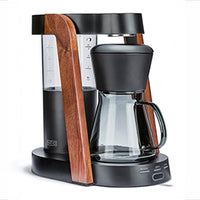Why Your "Strong Coffee" Might Just Be Over-Extracted Coffee
Some people love their coffee “strong.” Dark. Intense. Bold. But if your morning brew tastes bitter, dry, or almost hollow — it might not be strong in a good way.
In fact, what many people call “strong coffee” is actually just over-extracted coffee — where too much has been pulled from the grounds, including the compounds you don’t want.
The result? A brew that tastes harsh rather than flavorful, burnt rather than bold. And it’s surprisingly easy to do.
Let’s break down what over-extraction really is, why it ruins your cup, and how to tell the difference between strong and simply overdone.
What Extraction Actually Means
Extraction is the process of water pulling soluble compounds from ground coffee. These include:
-
Acids (brightness and fruitiness)
-
Sugars (sweetness and body)
-
Bitter compounds (structure and depth)
In a well-extracted cup, these elements are balanced. But if you go too far — extract too many bitter or dry-tasting compounds — the result is over-extraction.
Signs your brew has crossed the line:
-
Bitter or astringent aftertaste
-
Drying mouthfeel
-
Hollow or sharp flavor
-
Lingering unpleasant notes
How Over-Extraction Happens
Several factors contribute to over-extraction, including:
1. Too Fine a Grind
Finer particles extract faster. If your grind is too fine for your brew method, water lingers too long and pulls more than it should.
2. Brew Time Is Too Long
Especially in immersion methods (French press, AeroPress), letting coffee sit too long means more bitter compounds dissolve into your cup.
3. Water Is Too Hot
Temperatures above 205°F accelerate extraction — sometimes too much, especially for light roasts or delicate beans.
4. Incorrect Ratio
Using too little coffee for the amount of water increases contact time and volume per gram, leading to over-extraction.
Each one of these can take your cup from balanced to brutal.
Strength vs. Extraction: What’s the Difference?
Here’s where most people get tripped up: strength is not the same as extraction.
-
Strength = concentration of dissolved solids in your cup (how much coffee per water)
-
Extraction = how much of the coffee’s soluble material is pulled out during brewing
You can have a strong coffee that’s well extracted — and it tastes rich, complex, and satisfying. But if it’s over-extracted? It tastes intense, but in all the wrong ways.
Think of it like cooking:
-
A rich sauce is strong and flavorful
-
A burnt sauce is overdone — bitter and overwhelming
Same goes for your cup.

How to Tell If Your Coffee Is Over-Extracted
You don’t need a refractometer to diagnose this — your palate can tell. Ask yourself:
-
Does it taste bitter or sharp in the finish?
-
Is the mouthfeel dry or papery?
-
Are there no sweet or round notes left?
-
Does the cup linger unpleasantly?
If yes, chances are you’re overdoing something — grind, time, heat, or ratio.
How to Brew Strong Coffee the Right Way
If you love a punchier brew, you don’t have to suffer bad flavor. Try this instead:
-
Increase your coffee dose, not your brew time
-
Keep extraction balanced with the right grind and time
-
Use higher quality beans with naturally bold profiles (e.g. Sumatran or dark-roasted Latin American)
-
Consider a pressurized brew method like moka pot or espresso for more concentrated cups
Strength should come from intentional concentration, not accidental overwork.
Why Over-Extraction Wastes Good Beans
The worst part of over-extraction? It ruins everything your beans have to offer.
Complex origins, floral notes, fruity undertones — all of these vanish under bitter, burned-out dominance. You paid for those flavors. Don’t let your technique erase them.
Brewers like those from Ratio Coffee are engineered to deliver balanced extractions every time — no guesswork, just clarity. But even with the best machine, dialing in your variables matters.
Don’t chase “strong” at the cost of character.
Embrace Boldness — Without Burn
There’s nothing wrong with liking bold coffee. But boldness doesn’t have to mean bitterness.
By learning to distinguish between true strength and over-extraction, you empower yourself to brew with more intention — and get more from your beans.
So next time your cup hits a little too hard on the tongue, pause before blaming the roast. Check your grind, your time, and your technique.
Because the strongest coffee isn’t the one that smacks you in the face — it’s the one that keeps you coming back for another sip.
Frequently Asked Questions
Is bitter coffee always over-extracted?
Not always — dark roasts are naturally more bitter. But if it’s overly sharp, dry, or unpleasant, over-extraction may be the culprit.
Can I fix over-extracted coffee after brewing?
Not really. Once brewed, the compounds are already in the cup. Better to adjust your next brew (shorter time, coarser grind, lower temp).
How can I make my coffee stronger without over-extracting?
Use more coffee per water (e.g. 1:14 instead of 1:16), but maintain appropriate grind and brew time.
What’s a good extraction time?
Depends on the method:
-
Pour-over: 2.5–3.5 minutes
-
French press: 4–5 minutes
-
AeroPress: 2–3 minutes
 Ratio Eight S2
Ratio Eight S2
 Ratio Eight Original
Ratio Eight Original
 Ratio Six
Ratio Six
 Ratio Four
Ratio Four
 Compare Machines
Compare Machines






